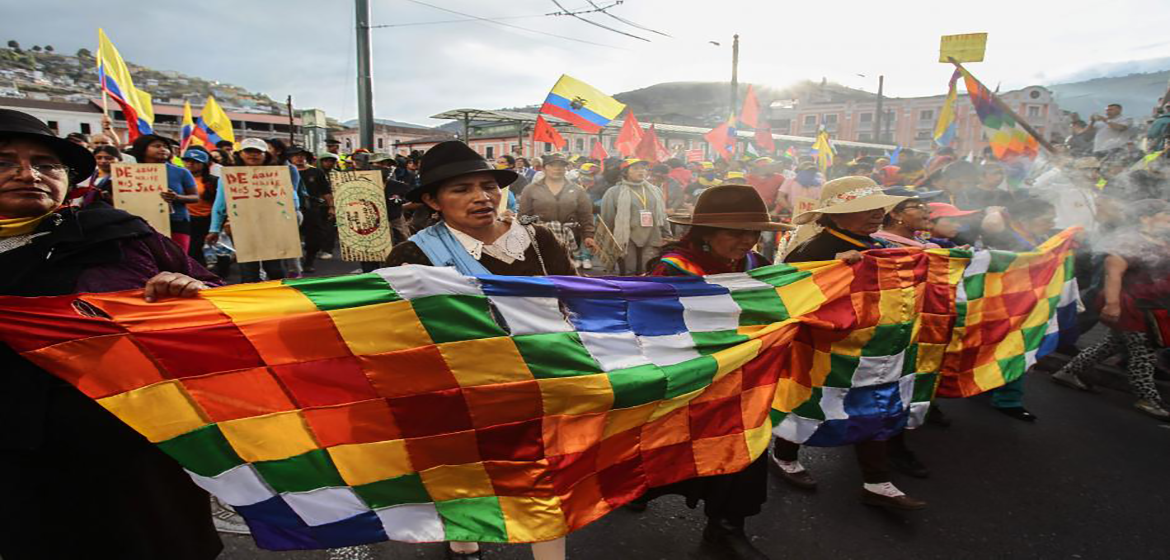Indigenous Leaders Could Be Jailed on Unsubstantiated Charges
The government of former President Rafael Correa abused the criminal justice system to target indigenous leaders and environmentalists who protested mining and oil exploration in the Amazon, Human Rights Watch said in a report released today. The groups are operating more freely under President Lenín Moreno, but the abusive prosecutions set in motion by his predecessor remain unaddressed.
The 30-page report, “,” shows that prosecutors in three prominent cases failed to produce sufficient evidence to support serious charges or justify the years-long continuation of a criminal investigation. On March 28, 2018, a trial court in Morona Santiago will rule on the case of a Shuar indigenous leader, Agustín Wachapá, for allegedly inciting violence through a Facebook post. On March 16, a court ordered the arrest of Pepe Acacho, another Shuar indigenous leader, to serve a prison sentence over a charge he never had an opportunity to defend himself at trial.
“President Correa lashed out on national TV against indigenous leaders and environmentalists who opposed extractive industry projects in the Amazon, while his Interior Ministry sought to jail their leaders and shut down their organizations,” said , Americas managing director at Human Rights Watch. “President Moreno has ended the bullying, and the environmental groups are operating more freely, but the abusive prosecutions need to stop.”
Ecuadorian authorities should ensure that none of these leaders serve prison time on charges they cannot substantiate or have not been made to prove in court.
Correa repeatedly denounced the leaders of protests against his environmental policies on his weekly TV show, calling for them to be punished. In 2013, the Correa administration arbitrarily shut down the Pachamama Foundation, one of the country’s most prominent environmental groups. In 2016, it sought to do the same with another leading environmental group, Ecological Action, but backtracked after the move provoked international criticism. Five United Nations special rapporteurs described the attempt to close down the group as part of a “.”
The Interior Ministry submitted a criminal complaint against Wachapá in 2016, prompting a prosecutor to charge him with “incitement to violence.” Wachapá was arrested and spent four months in pretrial detention in a maximum-security prison, 300 kilometers from his family. Human Rights Watch reviewed the file, and the only piece of relevant evidence is an on Facebook which, in Human Rights Watch estimation, is much too weak to support the serious charges prosecutors have chosen to bring.
In 2010, a prosecutor charged Acacho with “terrorism” for allegedly inciting violence during a 2009 Shuar protest against a new mining law. In 2013, a trial court found him guilty and sentenced him to 12 years in prison. Human Rights Watch reviewed the trial documents, including transcripts of the testimonies, and found no credible evidence to support Acacho’s conviction on terrorism charges.
Acacho appealed to the National Court of Justice, which in January 2018 overturned the terrorism conviction, but convicted him of “illegally impeding the free movement of vehicles, people or merchandise” and sentencing him to eight months in prison. He was never actually tried for this offense and did not have adequate reason or opportunity to contest its underlying facts at his trial on terrorism charges. A court ordered his arrest on March 16, hours after his defense lawyer submitted a constitutional challenge that could reverse his conviction. He could be forced to serve prison time for a crime for which he never had the opportunity to defend himself at trial.
In 2013, Correa’s government officials filed a criminal complaint against seven indigenous leaders and environmentalists who protested oil exploration in the Amazon. Correa had responded to an isolated incident of violence in the protest by berating the indigenous leaders and the environmentalist on national television, calling them “bad people, violent people, often corrupt” and calling on his interior minister to investigate them. More than four years later, the criminal investigation remains open, hanging over the activists’ heads, even though it has failed to yield any evidence against them.
Since taking office, Moreno has opened a dialogue with environmentalists, indigenous leaders and other government critics. His administration reinstated the Pachamama Foundation. In contrast to these positive steps, the abusive criminal prosecutions remain unaddressed.
Moreno should work to ensure the appointment of an independent and credible investigative body to examine how judicial authorities and the Attorney General’s Office conducted the cases Human Rights Watch documented and others begun recently under the Correa administration.
“Moreno – as well as judicial and legislative authorities – need to do much more to undo the damage done by Correa’s authoritarian approach to the critics of his environmental policies,” Wilkinson said. “That means putting an immediate end to judicial harassment of indigenous leaders and environmentalists, reversing the harm that has already been done, and taking steps to ensure it can never happen again.”
Source:
Related to SDG 10: Reduced inequalities and SDG 16: Peace, justice and strong institutions



